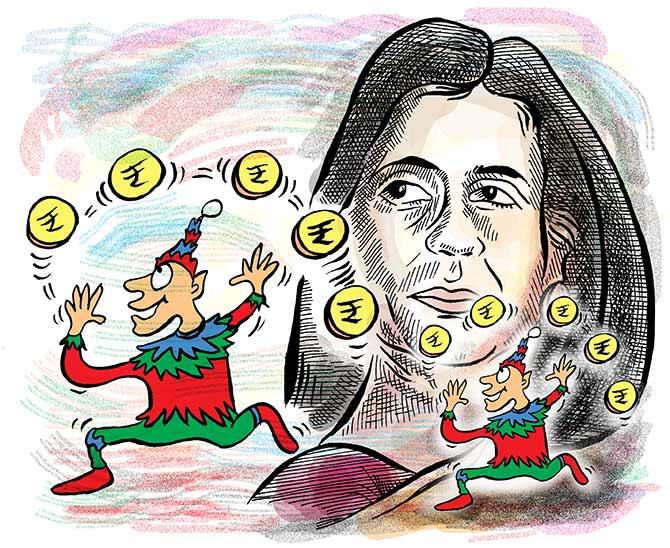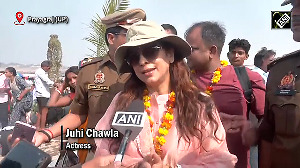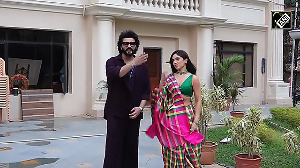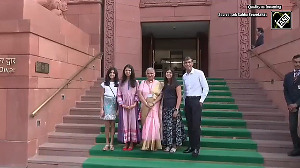'... not even a moral one, let alone a legal one.'
'Even if it is assumed that Deepak Kochhar tried to influence his wife into doing something dodgy for his 'social acquaintance', why would she do it?'
'By all accounts she has been granted share options in ICICI Bank of a very substantial amount which easily makes her a multi billion-pati.'
'She did not become CEO against some stiff competition by being stupid and concocting devious cock-and-bull renewable energy stories.'
S Muralidharan, former managing director, BNP Paribas, unravels the Deepak Kochhar-Videocon controversy.
Illustration: Uttam Ghosh/Rediff.com

Try as you might, you cannot escape the handsome smiling face of Deepak Kochhar on the TV channels. No doubt the picture was from another era, when things were going swimmingly for him and there was not a cloud in his silver linings.
His wife, poor thing, is now suddenly the fallen icon; one year she was one of the 50 (or 100) most powerful women and now it looks like she will soon be one of the 10 most 'wanted', but not quite in that way. What is this brouhaha all about?
As always, everyone and his/her grand uncle is mouthing off about this issue without the least clue as to what the words mean, let alone what they mean together.
TV anchors are putting on a stern face and summoning up their inner indignant selves when the studio lights come on and the words ICICI, Deepak, Nu, Energy, or Kochhar pop up on the teleprompter.
Strangely, the usual suspects are silent, no doubt waiting to see if the timeline starts when they were in power.
The current dispensation is not sure whom to fight back in the absence of noise from the vocal minority and hence keeping their powder dry for another day.
Even the Curly-haired Commie, a man not given to reticence in the absence of facts, is quiet.
Some people are happy, possibly even delirious.
The beleaguered chiefs of PSU banks in general and of PNB in particular are without doubt thanking the celestial powers that for once the raucous public is baying for someone else's blood, not theirs.
I suspect their relief is going to be short lived, poor sods. This 'private sector scam' is the cavalry that saves the owners and managers of PSU banks in the nick of time, to fight another day.
Another month, another scam...
NiMO must be chuckling in his uber-comfy Manhattan condo at the mathematical irony of 64 trumping 12,000 (crores).
The Talking Heads, Chatterati and the Metropolitan Elite are drowning their sorrows in choice malts now that the Kochhars are not yet hanged, drawn and quartered.
The CBI is clueless and will remain so despite the numerous obligatory visits to offshore financial havens and global financial centres that will ensue, only to return empty-handed; Mauritius, Singapore, Cayman Islands... yum, yum, this case reads like a Thomas Cook holiday brochure.
The political class is happy that the middle class has been silenced, however temporarily, that one of their own heroes/heroines has concocted a scam which the latter usually accuse the former of.
There is distinct glee and schadenfreude among the chatterati that a 'rising star' has been humbled, brought to her knees, shown her place etc.
Women, please don't make this about 'the revenge of the patriarchy' and please let the law take its course.
Dear Fearless Crusaders of the Net (with anonymous handles), if you have light to shed, please do so, just don't hyperventilate with non-facts -- yes, Mr Famous-crusading-Lawyer, I am talking to you: Your Youtube video is a disgraceful vomit of non-facts and political diatribe.
It is not time for recriminations, but for facts and fact-based analysis to piece together what really happened.
Let us not turn this into a morality play for aspirational women wanting to be successful in the public eye.
What is this brouhaha all about?
In sum and substance, it is alleged that the Videocon group paid a large sum of money to Deepak Kochhar, ICICI Bank CEO Chanda Kochhar's husband, as a quid pro quo for a large loan from ICICI Bank to the Videocon Group.
Plain and simple allegation. Should be easy to prove, right? Wrong! The time lines and complex flows of cash via circuitous routes, in my opinion, put this beyond the ability of our investigators to prove conclusively.
However, those readers who have flown kites will no doubt know that a tangled ball of string can be unravelled with a bit of diligence, oodles of patience and a modicum of intelligence, which attributes are all beyond our investigators.
Let's a take a look at the time line of events: In December 2008, Deepak Kochhar started a firm, NuPower, to ostensibly operate in the renewable energy sector.
He strangely invites Venugopal Dhoot, chairman of the Videocon group whom he knew 'socially', to be a 50/50 partner in the venture.
Dhoot, being a man of a charitable disposition, agrees to this proposal.
(In all the subsequent paragraphs, I will use Deepak Kochhar as the proxy for his family members and various firms and entities in his control. Similarly, 'Dhoot' will represent himself, family and generally Videocon entities including his surrogates).
They each contribute Rs 2.5 lakh as capital in the new venture.
In January 2009 Dhoot resigns from the board of this company within 22 days of joining Kochhar.
The reason given by Kochhar for this rapid exit is that Dhoot lost interest in solar energy and decided to concentrate on his petroleum-based businesses. But Dhoot retains his 50% stake.
All goes quiet for a while.
Suddenly, in March 2010, Dhoot renews his interest in solar (it is, after all, renewable energy!) and lends Kochhar's venture Rs 64 crores.
Compare this sum to the firm's capital of only Rs 5 lakh (to the numerically challenged, that is 1,200 times the capital).
In our financial system it is the norm to lend not more than twice the capital as loan.
But 1,200 times, and that too to a 'social acquaintance'?
I ask the readers to make their own conclusions.
The loan is given by Supreme Energy, which is 99.5% owned by Dhoot. (Remember I use this name to include the person, his family, his business ventures and surrogates).
What led to this sudden change of heart on the part of Dhoot is not known.
By this time, through a set of transfers of shares, Dhoot, through Supreme, also becomes 95% owner of NuPower.
We have no idea at what price the shares of Nu were purchased by Supreme, but I am willing to bet it was not at face or fair value.
If it was at face value, then why was Dhoot effectively lending from the left pocket to the right?
In November 2010, the story gets, as Alice would have put it, curiouser still.
Dhoot now gets out of Supreme and hands the company over to his associate Mahesh Punglia.
Punglia obediently transfers control of Supreme Energy to Pinnacle Energy Trust.
Guess what? The managing trustee of Pinnacle is none other than our old friend Deepak Kochhar.
Now sit down before I tell you how much Pinnacle paid for Supreme: 9 lakh.
Not dollars, but Indian rupees.
Pinnacle pays Rs 9 lakh to buy a firm with assets of Rs 64 crores (the loan given to NuPower by Supreme is an asset in its books).
Think of it as your buying a house. You buy a house along with your friend and get out within 22 days.
Then after a year you lend 1,200 times the value of the house to the friend whom you ditched and slowly, behind the scenes, buy 95% of the house off your friend.
Then a few months later you transfer the house to your associate who then transfers it to your friend for peanuts.
Any sensible man would do that, right?
By 2017, 57% of NuPower was reportedly owned by a Mauritius-based company, DH Renewables.
In 2016, nearly 100% was owned by Kochhar and surrogates.
Over 50% of the company had been transferred to the Mauritius-based company between 2016 and 2017.
Some reports suggest that DHR in turn is 'owned' by an investment fund operating out of the Cayman Islands.
The trail there appears to go cold. Who is behind the Cayman trust is not known at this moment and probably will never be.
Enter ICICI Bank.
In 2012 ICICI Bank participates in a consortium led by SBI to restructure Rs 40,000 crores of loans to Videocon which the business group was unable to service.
The banking system and other banking authorities are delightfully vague if Rs 40,000 crores is the 'bad' money or it is the new 'good' money thrown after the old bad money.
Whatever the case, ICICI Bank's share of this new money is Rs 3,250 crores.
Such a 'consortium' lending approach was started with noble intentions, but like everything else in India quickly became a medium for dispersing and disowning responsibility for bad loan decisions.
Every member of the consortium 'relies' on the 'leader's appraisal' and the leader assumes that everyone has done his own due diligence.
Being a collective decision, in principle everyone is responsible, but in reality no one is accountable.
It is a fact little known outside banking circles that a meaningful dissent within the consortium is not possible.
You can say what you want in the privacy of the consortium meetings, so long as you fell in line with the majority views at the end of the meeting.
Usually leaders call the shots.
No one complains as this system absolves them of individual responsibility for their decisions.
Coming back to the ICICI Bank loan, much is made of the approval of Rs 3,250 crores -- they had no choice in the matter.
Also, in terms of time lines, the theory that Dhoot bought influence over ICICI Bank by becoming Kochhar's partner does not hold water since:
1. ICICI Bank was a minor partner in the lending consortium and could not reliably assure an outcome preferred by Dhoot, and
2. The loan restructure happened almost a decade after the partnership was forged.
Businessmen like Dhoot do not become rich by placing long bets on unborn foals of ordinary nags. They play for certainty.
Had he wanted to influence the loan restructuring on favourable terms, it could have been done much more easily through political influence in Delhi.
It would also have cost far less than Rs 64 crores.
All sorts of stretch is made to fit Rs 64 crores into the narrative; none holds any water.
Even if it is assumed that Deepak tried to influence his wife into doing something dodgy for his 'social acquaintance', why would she do it?
By all accounts she has been granted share options in ICICI Bank of a very substantial amount which easily makes her a multi billion-pati in rupees (that is hundreds of crores) and multi-millionaire in dollars.
She did not become the CEO against some stiff competition by being stupid and concocting devious cock-and-bull renewable energy stories.
I am willing to bet that there is no case against her -- not even a moral one, let alone a legal one.
As for her board, I am not so sure. They had received some information of some dodgy deals involving Videocon, Kochhar and the bank, sent by one Arvind Gupta, a whistle-blower.
It should have been the easiest thing for them to call in an outside forensic audit into the matter and await its report.
But they work overtime to give their CEO a clean chit without so much as a second look at the facts of the deals between Kochhar and Videocon.
If the board had started out to destroy her, they could not have done a better job.
The board perhaps brought consortium practices into their own meeting room -- follow the leader and lose individual responsibility in collective stupidity.
To summarise what we think we know now, there are a few possibilities:
A. It was influence-buying in ICICI Bank through Kochhar and his wife.
B. It was a tax-dodge that needed a partner to obscure the cash trail. Deepak was used for this purpose.
C. Dhoot saw the endgame approaching for Videocon and wanted to stash cash for his personal use and found a credulous partner in Deepak.
D. Deepak wanted to match his wife's success with his own and found Dhoot willing to lend his name and even some money.
But how do these possibilities hold up?
A. Unlikely as Dhoot could buy political influence in Delhi far more easily for a far lower sum.
B. All businessmen dodge tax and have elevated it to an art form. Why would they do that with a man they just met at a party?
C. I am unable to persuade myself that Indian business promoters would be unaware of the endgame nearing and have not lowered the life raft/golden parachutes for themselves and their families. Question of using a third party acquaintance (pun intended) for such an important thing does not arise.
D. This is certainly a possibility with a high probability. After all, the man himself is reported to have said that 'the husband of a successful woman cannot be expected to sit at home'. That provides the motivation for his deals. The means were provided by his party-friend. But why was the devious route taken unless there was something to hide? But what exactly is being hidden?
What did Chanda Kochhar know and when?
The gallant Deepak has said it was when Dhoot exited the partnership 22 days after entering it. That is still January 2009.
Should Chanda not have been concerned by this flip-flop by her husband's partner, especially when he happens to be one of the big clients of the bank she led?
Did she not sit Deepak down and have 'The Talk'? If not, why not?
Should she not have advised him to clear all of his future partnerships with her and extracted a promise from Deepak not to have anything to do with her bank's clients any more?
To paraphrase Julius Caesar, should Kochhar not only have been kosher, but seen to be kosher?
Some questions investigators would do well to pursue are as follows:
1. Why would a leading businessman of India choose a 'social acquaintance' to be a partner in his business? Or accept when such an acquaintance invites him to be the partner? What did Dhoot know of Kochhar's acumen and special expertise in renewable energy?
2. Having partnered Kochhar, why did Dhoot leave in just 22 days? Did he realise that there was no expertise? Then why did he retain his 50% shareholding at that stage? What was the motivation?
3. Having severed his personal connection with NuPower, why did Dhoot lend Rs 64 crore to it through his 99.5%-owned company? If his plan as per point 2 above was to distance himself from NuPower, why did he get close again?
4. What was the basis for the loan 1,200 times the capital of the borrower? Where did that money come from? I am unable to shake off the feeling that somehow that money was taken from the operating entities in the Videocon group who in turn must have taken it from their bankers for some expansion/new project! Once inside NuPower, where did that money go?
5. Why did Supreme Power acquire 95% of NuPower, after Dhoot walked in, then out? Could he not make up his mind (I doubt it) or was it a ploy to obscure the money trail or some elaborate tax fraud?
6. Why was Supreme transferred to Dhoot associate Punglia first, before it was sold to Kochhar? This appears to be a clear attempt to insulate Dhoot from the later transfer to Kochhar for peanuts. If it was kosher, why the convoluted trail?
7. What was the amount paid to acquire 95% of NuPower? To whom was it paid, how and where?
8. Why did Kochhar buy Supreme in a trust controlled by him rather than a proprietary firm/partnership/limited company as is the norm in business? Is it to evade scrutiny and reporting requirements under company laws or to obscure beneficial ownership from the public eye? Who are the beneficiaries of the trust?
9. Why did DH Renewable of Mauritius acquire a majority shareholding in NuPower? What was the consideration? What was the business rationale/logic? To whom was the consideration paid?
10. Who owns/controls DH Renewable Mauritius? And who owns them and so on? Why this layer upon layer of screens? Who is hiding what?
11. What exactly has NuPower done with the Rs 64 crores it received? What has it set up? How much power has it produced? How did it rack up accumulated losses of Rs 78 crores? How did it fund the losses?
12. What was the role played by Rajiv Kochhar in 'restructuring' overseas loans of ICICI Bank? What were the specific cases and what were the haircuts taken by the bank in those cases? Who was made accountable for the write-offs/haircuts/losses (there must have been, for a restructuring expert to be called in) in those loan settlements?
There are a lot of questions now and I am afraid even after this thing has played out, most of them will remain unanswered.
But some things are clear: The succession of veils and back and forth transactions and transfer of ownership through devious means can all mean only one thing: Somebody has something to hide.
Who is it and what is he hiding?
Was Deepak the sinner or was he lured into a complex web by his social friend?
When confronted with a difficult issue I use the Duck Test: If something looks like a duck, walks like a duck, quacks like a duck and smells like a duck, IT IS A DUCK.
Unfortunately we live in an age of laws and courts and lawyers and adjournments ad infinitum and of political interference and influence peddling/buying; ours is neither Rome-rajya nor Ram-rajya where Caesar and his wife, and Ram and his wife, were required to be seen to be above suspicion.
We live in an era when innocence means not getting caught.
I cannot shake off the feeling that despite dead bodies littering the place, everyone will emerge innocent in this saga.
S Muralidharan retired as managing director, BNP Paribas, after serving the bank for 20 years.










 © 2025
© 2025